Calgary Short-Term Rental Regulations - 2025 Update
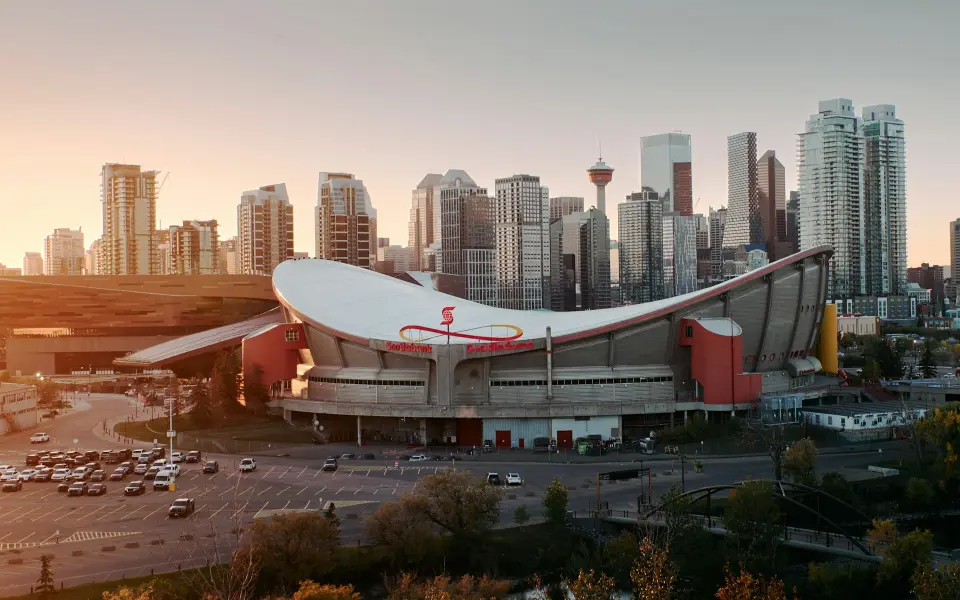
Calgary’s short-term rental regulations were overhauled on 1 April 2025 when the Calgary City Council's third reading of the new Business Licence Bylaw went into effect.
The amendments, which include an expanded definition of what constitutes a short-term rental in the city, was approved unanimously in December 2024. The reform aims to improve oversight of the short-term rental market while keeping the city’s commitment to a fair and sustainable environment for neighbours, guests and hosts alike. This includes protecting housing affordability, elevating guest safety and addressing neighbourhood concerns while preserving the economic benefits of tourism.
Why Calgary Updated its Business Licence Bylaw for Short-Term Rentals
In 2024, by‑law officers had identified three problem areas:
Rapid growth of commercialized short-term rentals that threatened housing availability.
Gaps in safety oversight — especially in apartments without existing fire safety standards.
Licence rules that confused first‑time short-term rental hosts and slowed down regulatory compliance.
In fact, a previous study by McGill University had shown that the top 10% of Airbnb hosts in Calgary earn more than half of all revenue, creating a widely unequal playing field for residents and hosts alike.
This led to city council taking up new amendments which were passed by unanimous vote in December 2024 and going into effect on 1 April 2025.
How Does Calgary Define a Short-Term Rental?
As of April 1, 2025, a short-term rental means the business of providing temporary accommodation for compensation, in a dwelling unit or portion of a dwelling unit, for periods of up to 180 consecutive days, by advertising or otherwise listing with a short-term rental company.
Previously defined as only encompassing a consecutive stay of up to 30 days, the new definition addresses regulatory gaps between month-long stays and long-term leases.
The definition extends to short-term rental properties of all types including entire homes, suites, strata units and separate rooms.

What are the Short-Term Rental Licence Fees in Calgary?
Category | New licensing cost | Licence renewal cost | Notes |
Primary residences | $172 | $131 | New primary residence applications remain open year‑round |
Non primary residence rentals | $510 | $260 | New non primary licences can be paused if vacancy < 2.5 % |
All licences pay $114 in fire inspection fees (including on renewal) and must pass annual fire inspections under the supervision of the Calgary Fire Department.
Short-term rental hosts must display their business license number on every online listing; failure triggers a $1,000 fine, designed to achieve voluntary compliance.
A potential moratorium on new non-primary residence licences activates only if the Canada Mortgage and Housing Corporation vacancy rate dips below 2.5%, currently at 4.8%. Primary licences remain unaffected.
What are the Application Requirements for a Calgary Short-Term Rental Business Licence?
1. Ownership and authorization
Property owners hoping to host a short-term rental in Calgary must provide:
Valid photo identification if the short-term rental property is their primary residence.
Proof of property ownership such as land title documents or consent to a land title search conducted by the City of Calgary.
If the property is not owned by the prospective short-term rental host or property manager, they must also provide
Written approval from the property owners in the form of a signed letter of authorization from the owner of the short-term rental property.
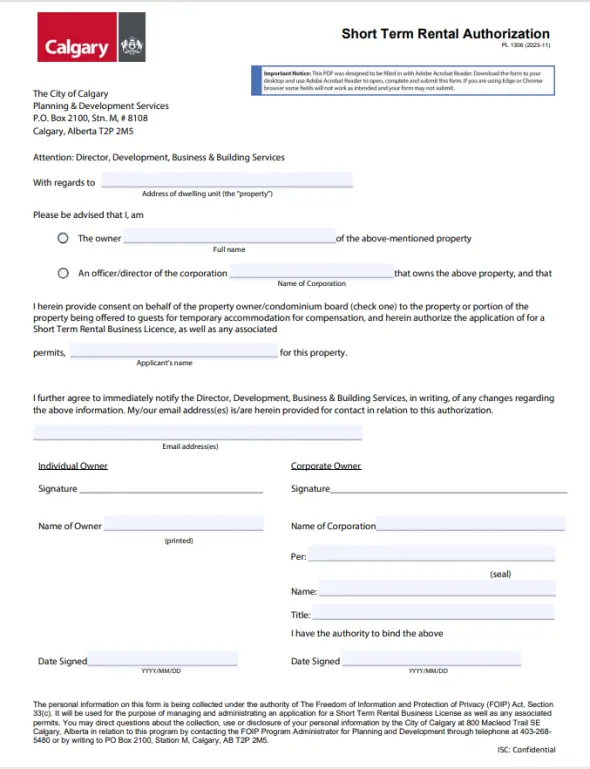
If the short-term rental property is a condominium, hosts must obtain permission from their respective condo board and adhere to their conditions, but the City no longer requires proof of condominium board consent to apply for a business licence.
2. Safety plans
Prospective hosts of short-term rentals must submit a copy of their fire safety plan, unless they are renewing their business licence and no changes have been made since their previous application.
Fire safety plans must be clear and span one page per floor. They must be detailed floor plans and can't be architectural plans.
Plans must include
Address
Room designations
All accessible floors in the rental property
Location of the fire exits from the rental property
Evacuation procedures for occupants including “Meeting Place”
Emergency contact information for local fire departments
Location of windows used for exit in case of emergency
Location of doors
Location of smoke alarm(s)
Location of CO – carbon monoxide detector(s)
Location of fire extinguisher(s)
Primary exit path from bedroom(s)
Secondary exit path from bedroom(s)
Legends to the symbols used in drawing
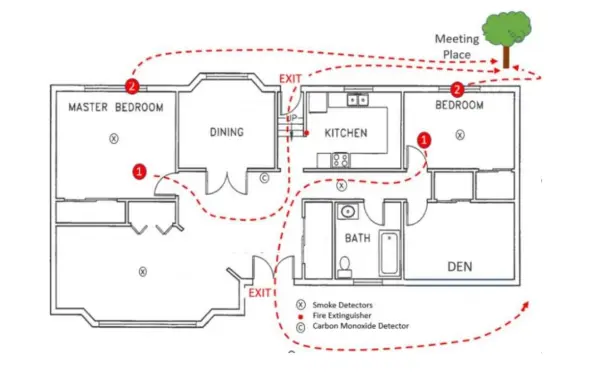
3. Insurance coverage verification
Business licence applicants must show proof of Home Sharing Liability Insurance Policy Coverage for their short-term rental property.
How to Apply For a Calgary Short-Term Rental Licence
First-time primary residence and non-primary resident applicants must create a myID account at myid.calgary.ca.
Once you've created your myID, apply for your business licence at https://apply.calgary.ca/shorttermrentals.
You can also apply in person by filling the application form and visiting the Calgary Planning Services Centre with all required documentation.
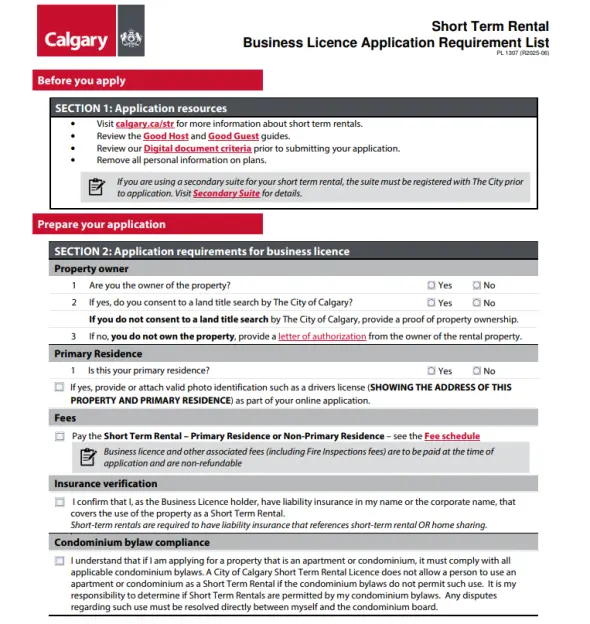
This ID can be reused when renewing business licences. Renewals can be completed 30 days in advance of the renewal date.
What are the Business Licence Categories for Short-Term Rentals in Calgary?
Post City Council update, Calgary recognizes two types of short-term rental categories:
Primary residence properties
Non-primary residence rental properties
This classification will also apply to existing hosts when renewing their business licenses.
Primary residence | Non-primary residence | ||
Owner requirement | You are the owner or have owner authorization and the home is your main dwelling. Proof of residence showing the address is required. | Owner requirement | You are the owner or have owner authorization, but you do not reside in the home. |
Number of bookings | One at a time | Number of bookings | One at a time |
People per room | 2 | People per room | 2 |
Maximum consecutive booking length | Up to 180 days | Maximum consecutive booking length | Up to 180 days |
As per the amended Business Licence Bylaw, licences will not be issued to residences designated as affordable housing. This measure is to ensure Calgarians have access to affordable housing.
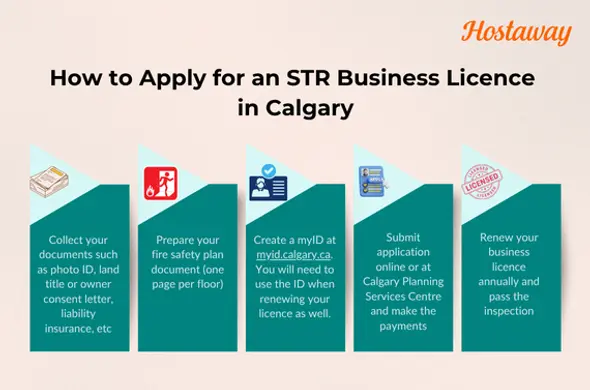
Calgary Short-Term Rental Operational Regulations
1. Occupancy and booking limits
The City of Calgary does not permit overlapping bookings. This means hosts can only have one reservation per residential unit and therefore can't rent out separate rooms to separate guests under different bookings. However, hosts can allow multiple rooms to be booked together under one reservation.
Occupancy is also capped at a maximum of two persons per room, regardless of room size. This enhances guest safety and addresses concerns of neighbourhood overcrowding.
2. Fire safety assurance
Calgary hosts are required to install and maintain smoke alarms, carbon monoxide detectors and fire extinguishers in all rented units. Alarms must be tested monthly and batteries replaced at least once a year.
Calgary hosts can only rent a room that has at least one egress window. They must be openable, have an opening sized ≥0.35 m² and be operable without tools or keys. Multi-storey apartments and condo buildings with existing fire safety standards are exempt.
Properties must undergo annual fire inspections, coordinated with the Calgary Fire Department, to verify compliance.
3. Guest records
Hosts must maintain a permanent record for each guest booking and provide it to the Chief Licence Inspector on demand. The record must be in English and in an electronic form.
Records must include
Full name and e-mail address of paid guests
Duration of their stay
4. Emergency contact
Calgary hosts must post the name, phone number and email address of an emergency contact person in a conspicuous location on their short-term rental property. The emergency contact must be reachable 24 hours a day.
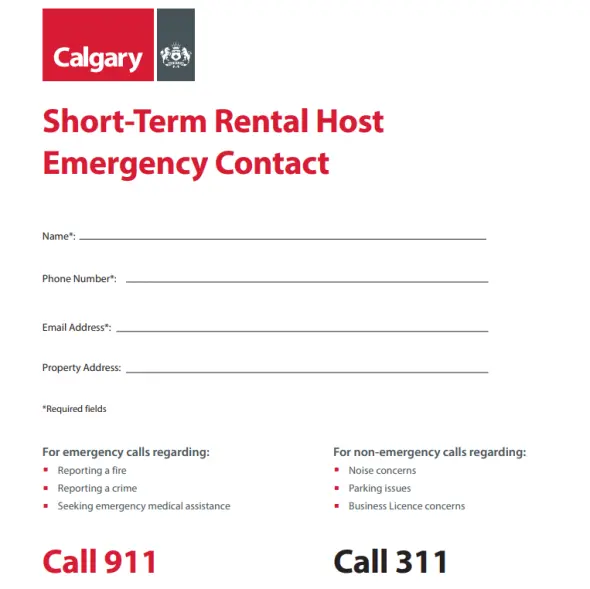
5. Licence display
The business licence number must appear on all online advertisements to signify compliance. This includes listings on digital rental platforms such as Vrbo and Booking.com.
Community and Municipal Bylaws in Calgary
Parking
Calgary hosts should inform guests about any parking restrictions, including permit zones, street cleaning schedules and seasonal parking bans (such as snow route bans).
Waste
Hosts must provide guests with access to garbage, recycling and composting bins, and should post local waste sorting guidelines as per the City of Calgary’s waste bylaws.
Noise and peace
Guests must observe quiet hours: 10 p.m.–7 a.m. on weekdays and 10 p.m.–9 a.m. on weekends and statutory holidays, as per the Community Standards Bylaw.
Other local laws
Hosts are also subject to Calgary’s Community Standards Bylaw, as well as Streets, Traffic, and Parking Bylaws, and any other relevant municipal or provincial laws. This includes rules about property maintenance, nuisance and public behaviour.
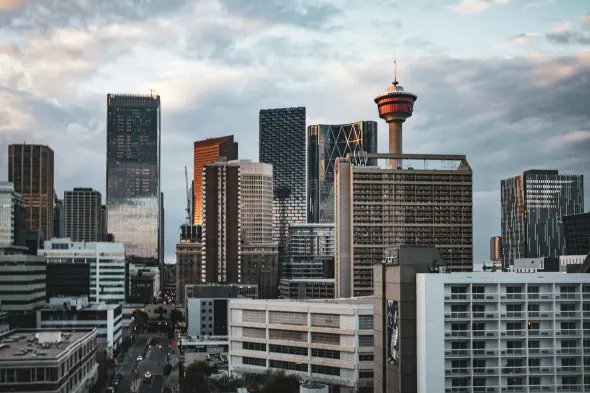
Enforcement & Penalties for Non-Compliance by Short-Term Rentals
The city aims to educate first in order to achieve voluntary compliance and will work with hosts to help them reach compliance. However, non-compliance will result in fines.
The following breaches will result in a fine upon conviction for the offense:
Offense | Fine (CAD) |
Offering a room without a window | $1,000 |
Allowing guests to sleep in a room without a window | $1,000 |
Allowing more than 2 adult guests per room | $1,000 |
Overlapping bookings | $1,000 |
Failure to include licence number on advertisement | $1,000 |
Failure to post emergency contact information | $1,000 |
Failure to maintain records of guests | $1,000 |
Failure to provide records of guests on demand | $1,000 |
Balancing Tourism and Housing: Where Calgary Stands in 2025
This comprehensive update provides clarity and alignment across all aspects of short-term rental business operations in Calgary. With explicit definitions, license categories, application steps, safety mandates and community bylaws outlined, vacation rental managers, property owners and Airbnb hosts can operate transparently and responsibly. Linking licensing to Canada Mortgage vacancy rates and affordable housing policy protects Calgary's long-term housing stock. Ultimately, the new regime — rooted in municipal oversight, platform cooperation and City enforcement — seeks to preserve the short-term rental market’s positives such as visitor spending, flexibility) while minimizing pressures on residents and rental affordability.
FAQs
1. Can I operate a short-term rental in an affordable housing unit in Calgary?
No. Residences designated as affordable housing are not eligible for use as short-term rentals under any circumstances. This regulation is part of Calgary’s effort to ensure that affordable housing stock is preserved for residents who need long-term access to stable accommodations.
2. Do I need my condo board’s approval to operate a short-term rental?
Yes and no. The City of Calgary no longer requires proof of condo board consent to issue a business license for a short-term rental. But this does not mean you are free to bypass your condo board.
Many condo boards still maintain their own rules regarding short-term rental activity. They may prohibit rentals altogether, restrict guest access to shared amenities or set quiet hour rules that go beyond City bylaws. If your short-term rental business violates your building’s bylaws, you may be fined or evicted by your board — even if you hold a valid licence from the City.
3. What is considered a “non primary residence” under Calgary’s licensing framework?
A non-primary residence is any dwelling that is not your main home. If you own or manage multiple properties, or if you rent out a unit you don’t live in, it will fall under this category. The City of Calgary issues non-primary residence licences separately from primary ones, with a higher licensing fee. There is also a conditional pause mechanism: if the Canada Mortgage and Housing Corporation reports a citywide vacancy rate below 2.5%, Calgary may temporarily suspend new non-primary residence licences to help ease pressure on the housing market.
4. I had a licence before. Do I need to reapply under the new regulations?
All existing licences are still valid, but you must ensure that you comply with the new operational rules when your renewal date arrives. Failure to align with the updated bylaw may result in non-renewal.
5. What role do short-term rentals play in the Calgary accommodation sector?
Short-term rentals have become a major component of the sector, offering flexibility and affordability to travellers. They allow homeowners and small property managers to compete with traditional hotels, driving innovation and economic growth. However, without regulation, short-term rentals can lead to reduced housing affordability, unsafe living conditions and conflicts with neighbours. The City’s updated rules aim to strike a balance between supporting this emerging industry and maintaining a healthy, liveable city for residents.
6. Why did Calgary expand the definition of a short-term rental?
The former definition only included stays of up to 30 consecutive days. However, many hosts began offering month-to-month accommodations just below the radar of municipal oversight. This created loopholes and allowed some operators to avoid licensing, safety and other compliance requirements. The expanded definition — now encompassing stays of up to 180 consecutive days — helps the City address regulatory gaps that were being exploited and brings consistency across the short-term rental business landscape.
Ready to find out how Hostaway can transform your business?
